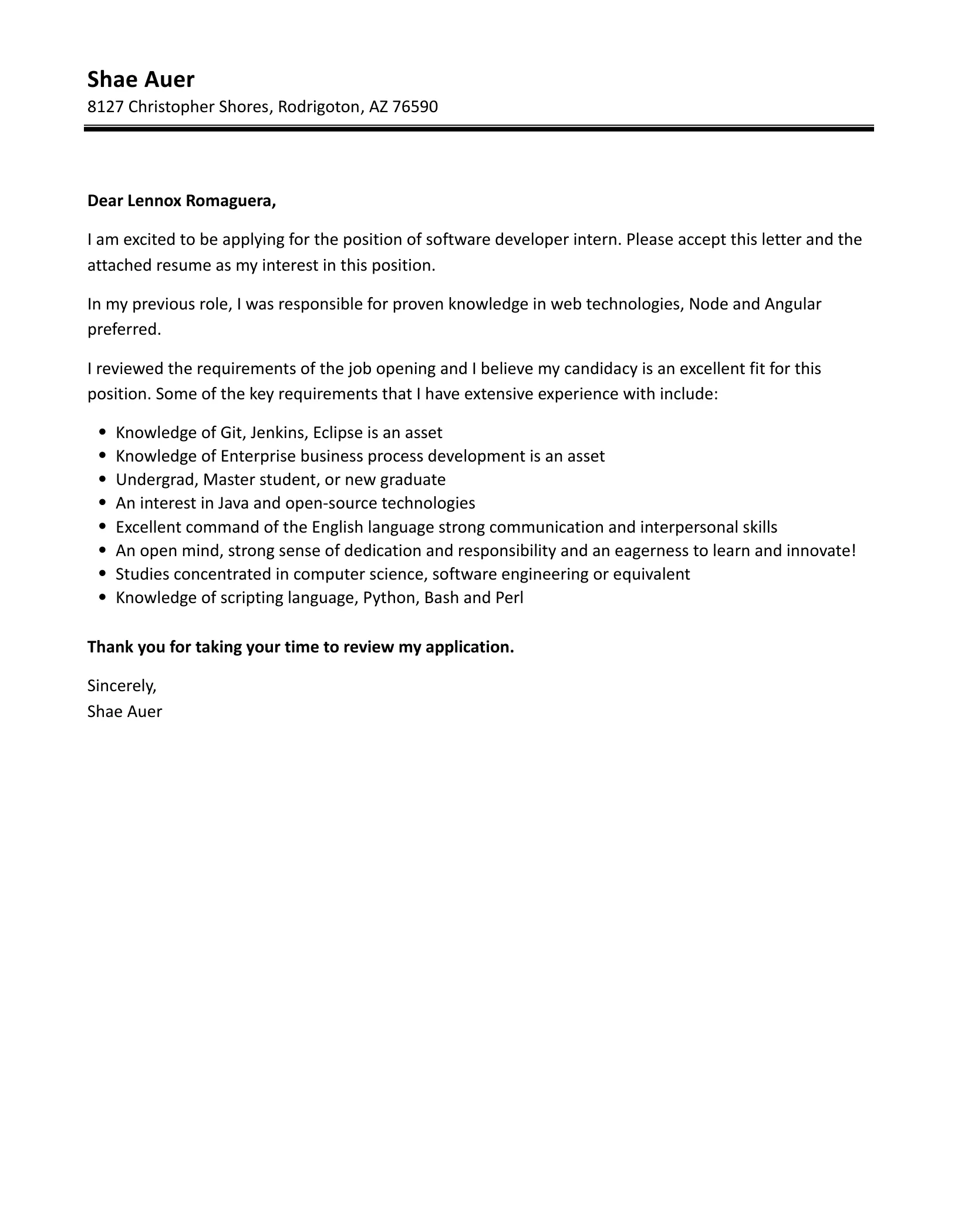What is a Software Developer Internship Cover Letter
A software developer internship cover letter is a crucial document that accompanies your resume when applying for software development internships. It serves as your introduction to potential employers, providing an opportunity to highlight your skills, experiences, and passion for the field. Unlike a resume, which provides a factual overview of your qualifications, a cover letter allows you to showcase your personality, explain your motivations, and demonstrate why you are a great fit for the specific internship and the company culture. A well-crafted cover letter can significantly increase your chances of getting noticed and securing an interview. It’s your chance to make a strong first impression and convince the hiring manager that you’re worth considering.
Why Cover Letters Matter for Internships
In the competitive landscape of software developer internships, a cover letter is essential. It distinguishes you from other applicants by allowing you to personalize your application and address the specific requirements of the internship. It’s an opportunity to showcase your writing skills, attention to detail, and communication abilities, all of which are vital in the software development field. A compelling cover letter can demonstrate your enthusiasm for the company and the internship role, which can significantly boost your application. Moreover, cover letters allow you to explain any gaps in your experience or qualifications, providing context and showing your eagerness to learn and contribute.
Highlighting Skills and Experience
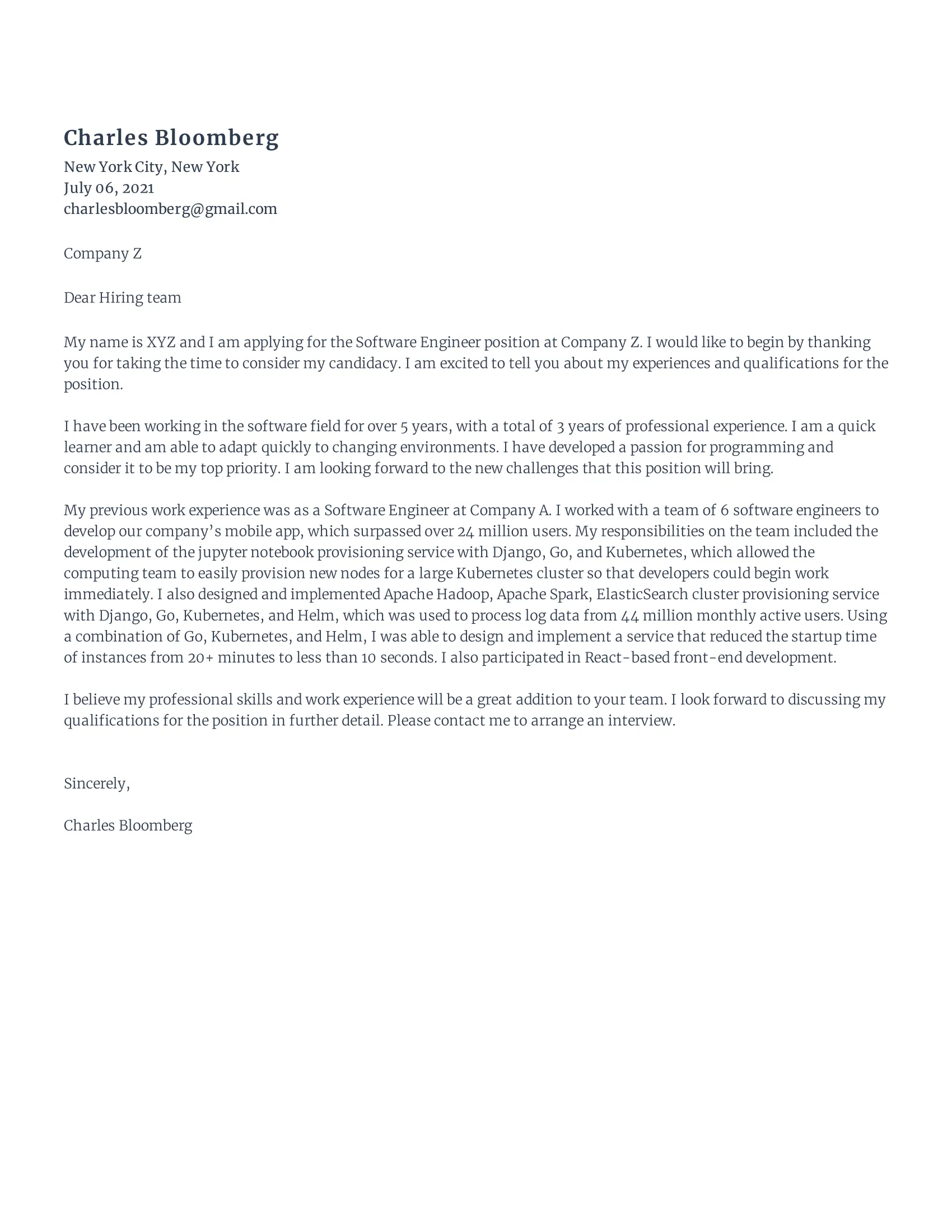
When crafting your software developer internship cover letter, strategically highlight your relevant skills and experiences. This section should be tailored to align with the specific requirements outlined in the internship description. Focus on the programming languages, tools, and technologies you’re proficient in, such as Java, Python, C++, or specific frameworks like React or Angular. Also, highlight any relevant coursework, projects, or previous internships that demonstrate your practical application of these skills. Quantify your achievements whenever possible, using data to showcase the impact of your work, such as the number of users impacted by a project or the percentage improvement in efficiency you achieved.
Tailoring to the Specific Internship
Each internship is unique, so tailoring your cover letter to the specific opportunity is essential. This means thoroughly researching the company and the role. Demonstrating that you understand the company’s mission, values, and recent projects shows genuine interest. By addressing the specific requirements and keywords mentioned in the job description, you can show the hiring manager you’ve carefully considered the role and are a strong match. Avoid using a generic cover letter; instead, customize it to reflect your understanding of the company’s needs and your ability to contribute to its goals. Personalize your letter by addressing the hiring manager by name if possible, and mention something specific that resonates with you about the company or the internship program.
Researching the Company Culture
Researching the company culture is critical for making your cover letter stand out. Explore the company’s website, social media profiles, and any online reviews to understand its values, work environment, and recent projects. This research allows you to tailor your letter to align with the company’s culture, demonstrating that you are a good fit. Highlight any specific aspects of the company culture that resonate with you, such as a commitment to innovation, teamwork, or community involvement. This level of personalization will show your genuine interest and help you stand out from other applicants. Showing you understand their values and align with them increases the chance of interview.
Matching Skills to Requirements
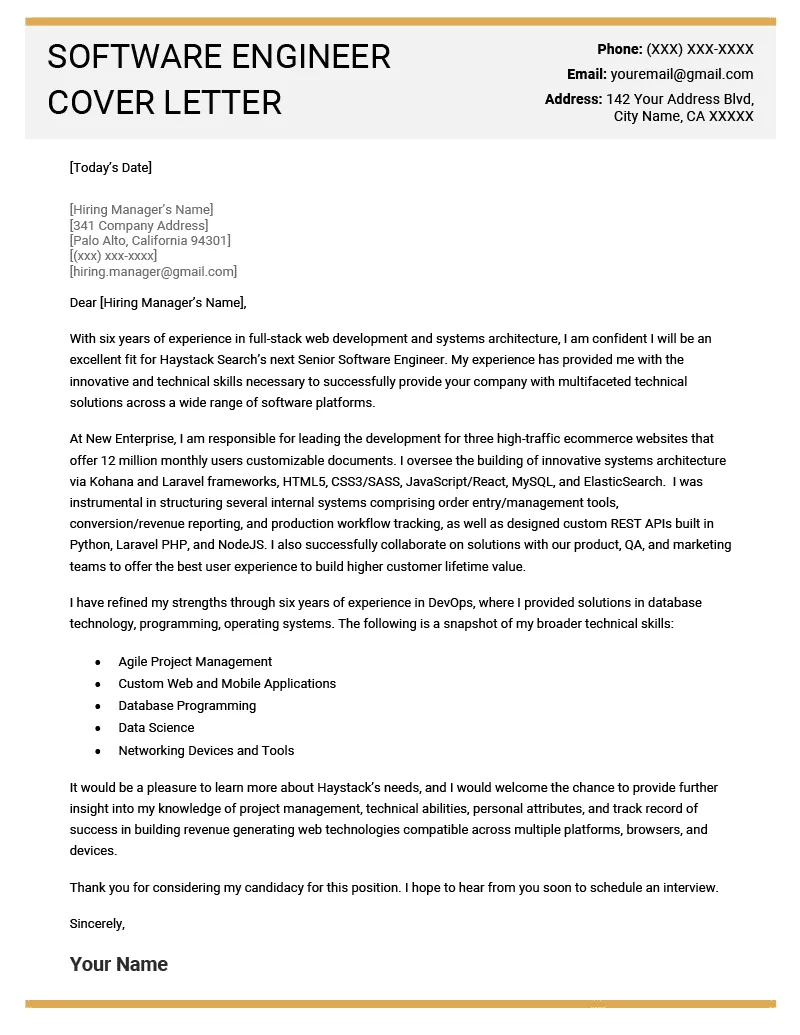
Carefully compare your skills and experiences with the requirements listed in the internship description. Identify the key skills and qualifications the employer is seeking and explicitly mention how your skills match those needs. This helps the hiring manager quickly assess your suitability for the role. Prioritize highlighting the most relevant skills and experiences. Use keywords from the job description to showcase your understanding and demonstrate that you meet the essential requirements. Be specific and provide examples of how you’ve used these skills in previous projects or coursework. This will demonstrate your qualifications in a clear and concise manner.
Showcasing Relevant Projects
Software development internships often require practical experience. Showcasing your relevant projects is crucial for demonstrating your capabilities. Include details about any personal projects, academic assignments, or contributions to open-source initiatives. Briefly describe the project’s purpose, your role, the technologies you used, and the results you achieved. If possible, include links to your projects on platforms like GitHub or a personal portfolio website. Choose projects that best align with the internship’s focus and showcase your skills and achievements in a clear, concise manner. This practical demonstration significantly strengthens your application and provides tangible evidence of your abilities.
Quantifying Achievements
Whenever possible, quantify your achievements to make your cover letter more impactful. Instead of simply stating that you worked on a project, provide specific data to illustrate the outcomes. For example, instead of saying, “Improved website performance,” you could write, “Improved website loading speed by 30% by optimizing database queries.” Quantifiable achievements make your accomplishments more tangible and demonstrate your ability to deliver results. Use numbers, percentages, or specific metrics to showcase the impact of your work. This demonstrates your attention to detail and your ability to measure and analyze your contributions.
Demonstrating Passion and Enthusiasm
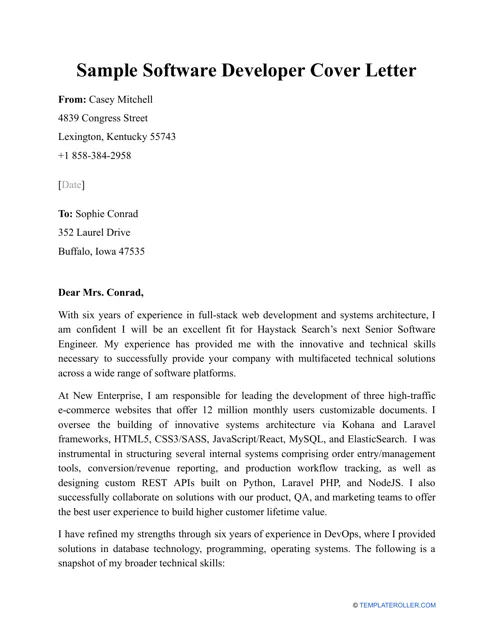
Expressing your passion and enthusiasm for software development is essential in your cover letter. This shows the hiring manager that you are genuinely interested in the field and are motivated to learn and grow. Show your enthusiasm by mentioning why you’re drawn to the company, the specific internship, or the type of work they do. Highlight any relevant interests, such as a particular programming language or technology. Your enthusiasm can set you apart from other candidates and showcase your eagerness to contribute and learn. Let your personality shine through while maintaining a professional tone.
Expressing Genuine Interest in the Role
Clearly express your genuine interest in the internship role by explaining why it specifically appeals to you. Describe what aspects of the role, such as the projects, technologies, or team, excite you. Mention any specific skills you hope to develop or contribute to. Demonstrate that you have thoroughly reviewed the job description and understand the role’s responsibilities. Tailoring your statements to align with the internship’s specifics will show the hiring manager that you are committed and interested in the opportunity. Ensure you highlight why the internship aligns with your career goals and what you hope to achieve during the experience.
Mentioning Specific Reasons for Applying
Provide specific reasons for why you’re applying for this particular software developer internship and why you are drawn to the company. This goes beyond generic statements and demonstrates your genuine interest. Mention specific projects, technologies, or initiatives that appeal to you. This shows you’ve researched the company and understand its mission. If possible, mention something unique about the company or the role that resonates with you. Your response should highlight how the internship aligns with your career goals, and explain what you hope to gain from the experience. Doing this personalizes your cover letter and sets you apart.
Using the Right Tone and Language
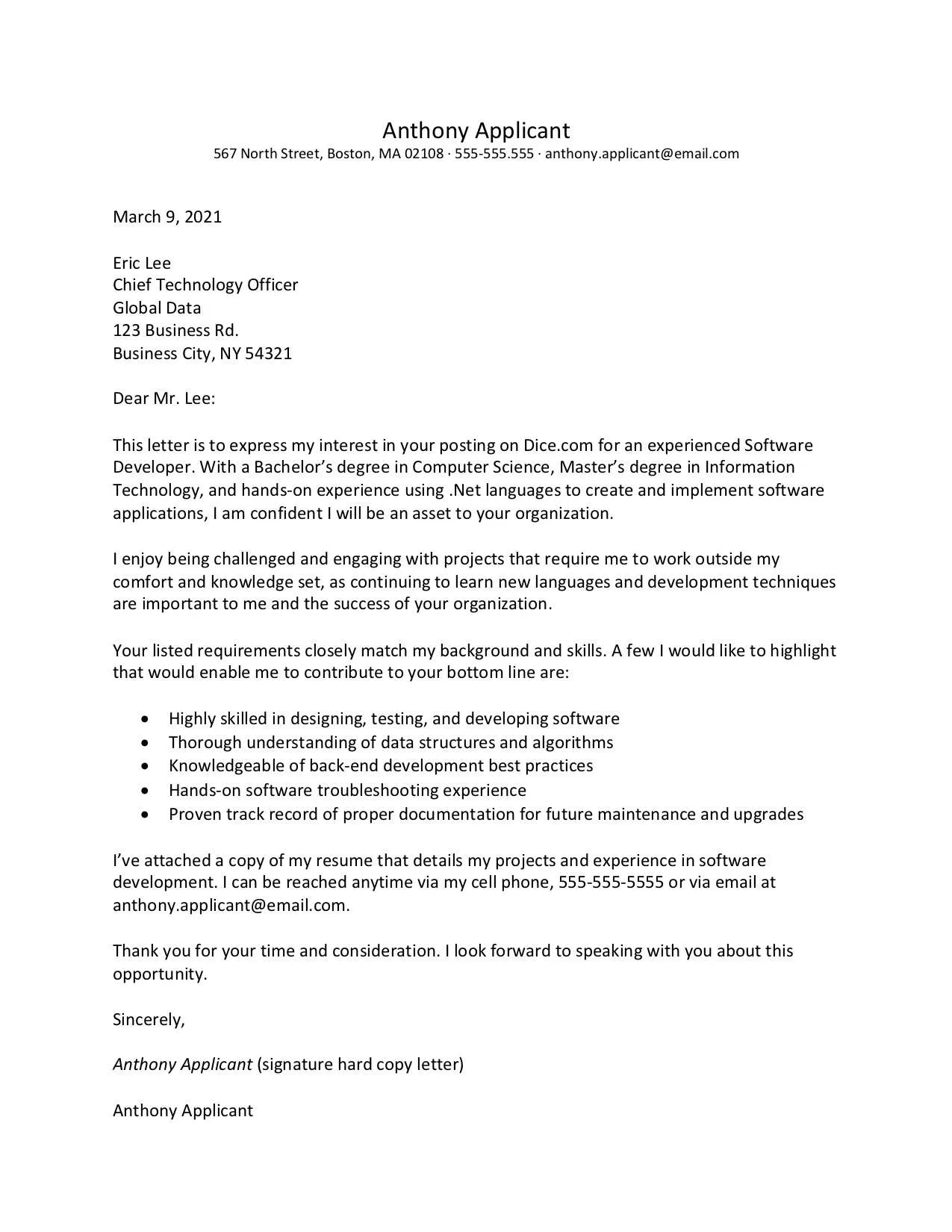
The tone and language you use in your cover letter should be professional, yet personable and engaging. Use clear, concise language that is easy to understand, avoiding overly complex jargon. Maintain a positive and enthusiastic tone throughout the letter, showcasing your excitement for the opportunity. While being professional is crucial, injecting a touch of your personality can make your letter more memorable. Ensure your writing is free of grammatical errors and typos. Using a formal, respectful tone can make a great impression, ensuring your cover letter is well-received by the hiring manager and helps you get noticed.
Professionalism and Clarity
Maintain a high level of professionalism and clarity in your cover letter. Ensure your writing is well-structured, with clear paragraphs and sentences. Use a professional font and formatting, such as Times New Roman or Arial, with standard margins and spacing. Avoid slang or informal language, and always address the hiring manager by their name if available. Proofread your letter multiple times to eliminate any errors. Your cover letter is a representation of your attention to detail and commitment to quality, and by demonstrating these qualities through clear, professional writing, you can make a great impression.
Proofreading and Editing
Thorough proofreading and editing are non-negotiable aspects of cover letter writing. Before submitting your application, carefully review your cover letter for grammatical errors, typos, and any inconsistencies. Read your letter aloud to identify awkward phrasing or sentences that need improvement. Ask a friend, professor, or career counselor to review your letter and provide feedback. Make sure your letter is error-free and presents your qualifications in a clear, concise, and polished manner. This attention to detail significantly increases your credibility and shows the hiring manager that you pay attention to details and are committed to quality.
Structuring the Cover Letter Effectively
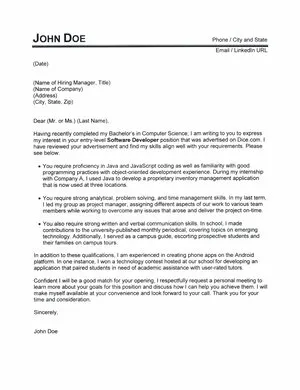
A well-structured cover letter is easy to read and conveys your message effectively. Use a standard format that includes an opening paragraph, body paragraphs, and a closing paragraph. Each section should serve a specific purpose and work together to present your qualifications and express your interest in the role. Maintain a logical flow and clearly state your purpose, skills, and achievements. Organizing your thoughts thoughtfully ensures your letter makes a strong impression on the reader.
Opening Paragraph
Your opening paragraph is your first chance to grab the hiring manager’s attention. Start by stating the position you’re applying for and how you found the opportunity. Briefly introduce yourself and your background. Include a strong statement of your interest in the internship and why you are a good fit. Make a positive first impression by highlighting your enthusiasm and showcasing your basic qualifications. Your introduction should set the stage for the rest of your letter, providing the reader with a clear idea of who you are and what you have to offer.
Body Paragraphs
The body paragraphs of your cover letter should provide a detailed account of your skills, experiences, and qualifications. Use these sections to highlight your most relevant skills and accomplishments, providing specific examples and quantifiable results where possible. Explain why you are interested in the company and the internship role. Tailor your examples to match the specific requirements outlined in the job description. Use your body paragraphs to show, don’t just tell the hiring manager that you are the best candidate. This will demonstrate your qualifications and make your cover letter stand out.
Closing Paragraph
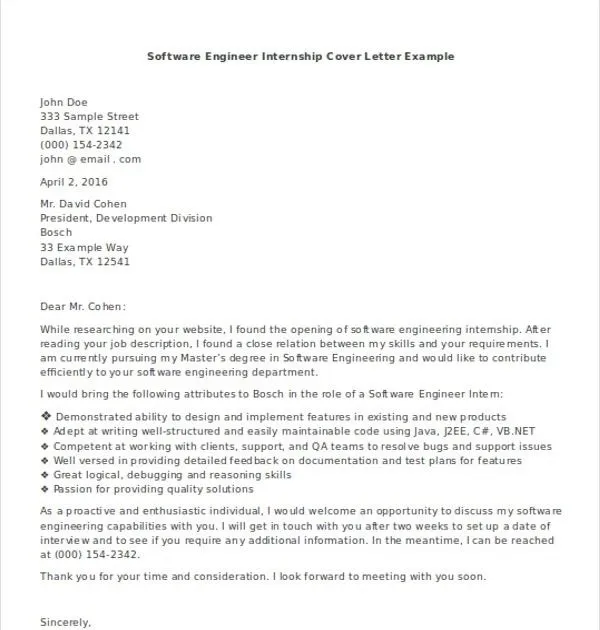
Your closing paragraph should summarize your key qualifications and reiterate your interest in the internship. Reiterate your enthusiasm for the opportunity and thank the hiring manager for their time and consideration. Include a call to action by stating your availability for an interview and how you can be reached. Use a professional closing, such as “Sincerely” or “Best regards,” followed by your full name. A strong closing paragraph provides closure and reinforces your message, leaving a positive lasting impression.
Top 5 Cover Letter Success Secrets
To create a winning software developer internship cover letter, focus on these five key secrets. By implementing these strategies, you can increase your chances of success and get noticed by potential employers.
Secret 1 Highlight Relevant Skills
Carefully review the internship requirements and identify the key skills and qualifications the employer is seeking. Then, highlight the skills you possess that align with these requirements. Use keywords from the job description to ensure your letter matches the employer’s needs. Provide specific examples of how you’ve used these skills in previous projects or coursework. Prioritize the skills that are most relevant and important for the role.
Secret 2 Demonstrate Passion
Express your genuine passion and enthusiasm for software development. Highlight why you are drawn to the company, the specific internship, or the type of work they do. Mention specific projects or technologies that excite you and showcase your eagerness to learn and contribute. Let your personality shine through while maintaining a professional tone. Show your enthusiasm with a few personalized details that will help the hiring manager to remember you.
Secret 3 Tailor Your Letter
Customize your cover letter to match the specific internship opportunity and the company’s culture. Research the company thoroughly to understand its mission, values, and recent projects. Show you’ve considered the role, and you’re a strong match. Avoid using a generic cover letter; instead, tailor it to reflect your understanding of the company’s needs and your ability to contribute. Personalize your letter by addressing the hiring manager by name if possible and mention something specific that resonates with you about the company or the internship program.
Secret 4 Quantify Achievements
Use numbers, percentages, or specific metrics to show the impact of your work. Quantify your achievements whenever possible. For example, instead of saying, “Improved website performance,” state, “Improved website loading speed by 30% by optimizing database queries.” Quantifiable achievements make your accomplishments more tangible and demonstrate your ability to deliver results. Quantifying the achievements will help the hiring manager understand the impact you made.
Secret 5 Proofread Thoroughly
Before submitting your application, carefully review your cover letter for any errors. Read it aloud, and ask a friend, professor, or career counselor to review it as well. Your cover letter should be free of grammatical errors, typos, and inconsistencies. Proofreading helps ensure that your qualifications are clearly and professionally presented. This attention to detail will increase your credibility and show the hiring manager that you pay attention to the small details.
